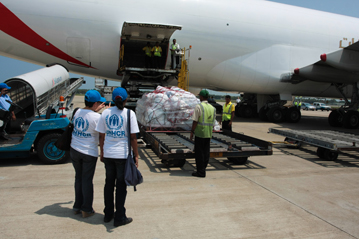More than 30,000 flee Côte d'Ivoire for Liberia, Guinea
More than 30,000 flee Côte d'Ivoire for Liberia, Guinea

DANANE, Côte d'Ivoire, December 6 (UNHCR) - Continued fighting in Côte d'Ivoire has driven more than 30,000 people into Liberia and Guinea in the last week, and caused the UN refugee agency to lose contact with more than 45,000 refugees in western Côte d'Ivoire.
Since fighting broke out last week in western Côte d'Ivoire's Man and Danané areas, at least 27,000 people have fled into neighbouring Liberia through 12 border crossing points. More returnees of Liberian origin may have reached their final destinations without being officially registered.
"It certainly took us by surprise," said Moses Okello, UNHCR Representative in Liberia, "because our scenarios were based on the prevailing situation of one rebel movement taking up arms in Côte d'Ivoire and negotiating with the government. We could not have foreseen the emergence of new movements and new pockets of fighting as was seen last week in the west of the country."
Among those registered, most were Liberians rushing home to escape the violence, with more than 2,600 Ivorian nationals joining them. To ease the build-up at the border, UNHCR in Liberia has sent 23 trucks there to move the new arrivals to safety. Most of the new arrivals are heading for eastern Liberia's counties of Nimba, Grand Gedeh and Bong.
"At this point, apart from providing essential water, health and shelter services, we are concentrating on our transport capacity," said Okello. "We also get many requests from people asking to be transported to Nimba and Lofa counties. Some are joining relatives in Monrovia."
For others who have nowhere to go, UNHCR will have to look for longer-term solutions. The agency has already set up three transit centres in Nimba and Grand Geddeh counties and is negotiating for a fourth one, further south in Mariland county.
According to Okello, among the new arrivals are people of mixed nationalities. "We have 78 Sierra Leoneans who are being taken to Monrovia today for repatriation, as well as 73 Guineans who will be assisted home. There are also small numbers of people of other origins, such as Ghanaians, Nigerians and even two Americans who lived in the troubled region and had to flee along with the others."
UNHCR's limited resources in the region, already stretched this year by the influx of 90,000 new Liberian refugees fleeing conflict at home and a massive return operation to Sierra Leone, are affecting its ability to cope with the current emergency. The agency can only distribute domestic items to specifically vulnerable cases and its staff are facing exhaustion. UNHCR recently appealed for $6.1 million to cover emergency needs for the first three months of the Ivorian crisis, and the money is urgently needed to help set up regional stocks in Ghana and deploy more emergency staff.
In Guinea, some 2,800 people fleeing Côte d'Ivoire have been registered at border crossings since last Friday. They include 1,151 Guineans, 853 Ivorians and 741 Liberians. Most are in Lola prefecture, just across from the western Ivorian areas of Man and Danané, where fighting is still raging. The recent arrivals are reported to be very tired, some having walked six to seven days. They are currently staying near the border in temporary shelters or with host families. UNHCR is working to transfer them to Nonah transit centre and Lainé camp near Nzérékoré as soon as possible.
Meanwhile, back in western Côte d'Ivoire, the refugee agency has lost contact with the remaining Liberian refugees hosted there - 45,000 before the exodus - as telephone lines have been cut and access to fighting zones forbidden. As such, the agency has no way of finding out the condition of these refugees.









